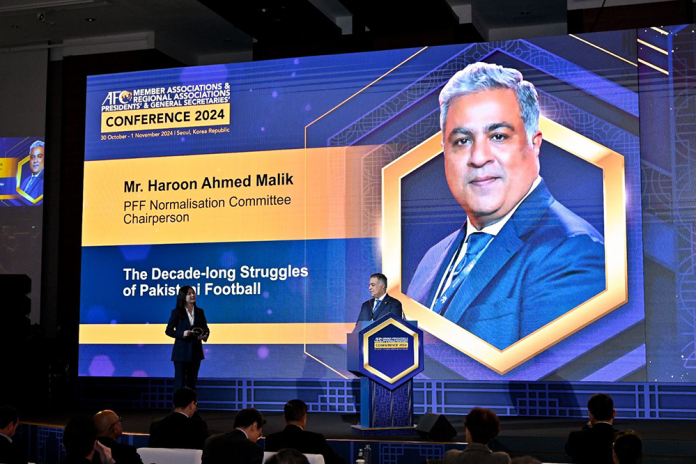At the AFC Member Associations and Regional Associations Presidents’ and General Secretaries’ Conference 2024 in Seoul, Haroon Ahmed Malik, Chairperson of the Pakistan Football Federation’s (PFF) Normalisation Committee, addressed global football leaders, casting light on the unique challenges of football in Pakistan. Malik’s presentation went beyond a routine report, capturing the enduring spirit and vision required to navigate Pakistan’s structural and political challenges.
A primary hurdle for Pakistan’s football development has been the lack of stable management within the PFF. “With frequent leadership changes, long-term strategies and consistent growth initiatives have struggled to take hold, limiting the sport’s potential and development in the region,” Malik stated. “The PFF has been plagued by inconsistent leadership and changes at the top, which has further stalled progress in football governance,” he noted.

Malik also highlighted ongoing issues in governance and political influence. The PFF Congress, composed of 26 members, includes a substantial number of government representatives, leading to concerns about political interference in key decision-making. “The heavy involvement of government officials has historically affected the autonomy and direction of the federation,” Malik pointed out. “This political influence continues to hinder Pakistan’s ability to implement an effective and independent football governance model,” he emphasized.

The ineffective reform process within the PFF has been another challenge. Despite multiple extensions from FIFA to address electoral and governance issues, meaningful progress was limited. “In 2017, after a lack of reform, FIFA suspended the PFF,” Malik mentioned. Although the Pakistani courts intervened in 2018, ordering elections, decision-making remained fragmented and reform sluggish. “Despite a two-year window to implement reforms, progress was so limited that another extension was granted. However, little was achieved, leading to another FIFA suspension in 2021,” he explained.
One notable area of progress has been in player and official registrations on the PFF’s platform. However, “without a reliable governance model, organizing football activities on a national level continues to be challenging,” Malik stressed. The electoral list used in 2015 was found to be outdated and inaccurate, complicating the electoral process and leaving many clubs ineligible to vote. “This has been another obstacle in achieving effective governance,” he added.

Malik’s message was one of resilience and hope. He emphasized that with international support and a unified effort to reform Pakistan’s football infrastructure, the country could overcome these longstanding obstacles and unlock its vast football potential. “With international support and a unified effort to reform Pakistan’s football infrastructure, we can overcome these longstanding obstacles and unlock the country’s vast football potential,” Malik concluded.


